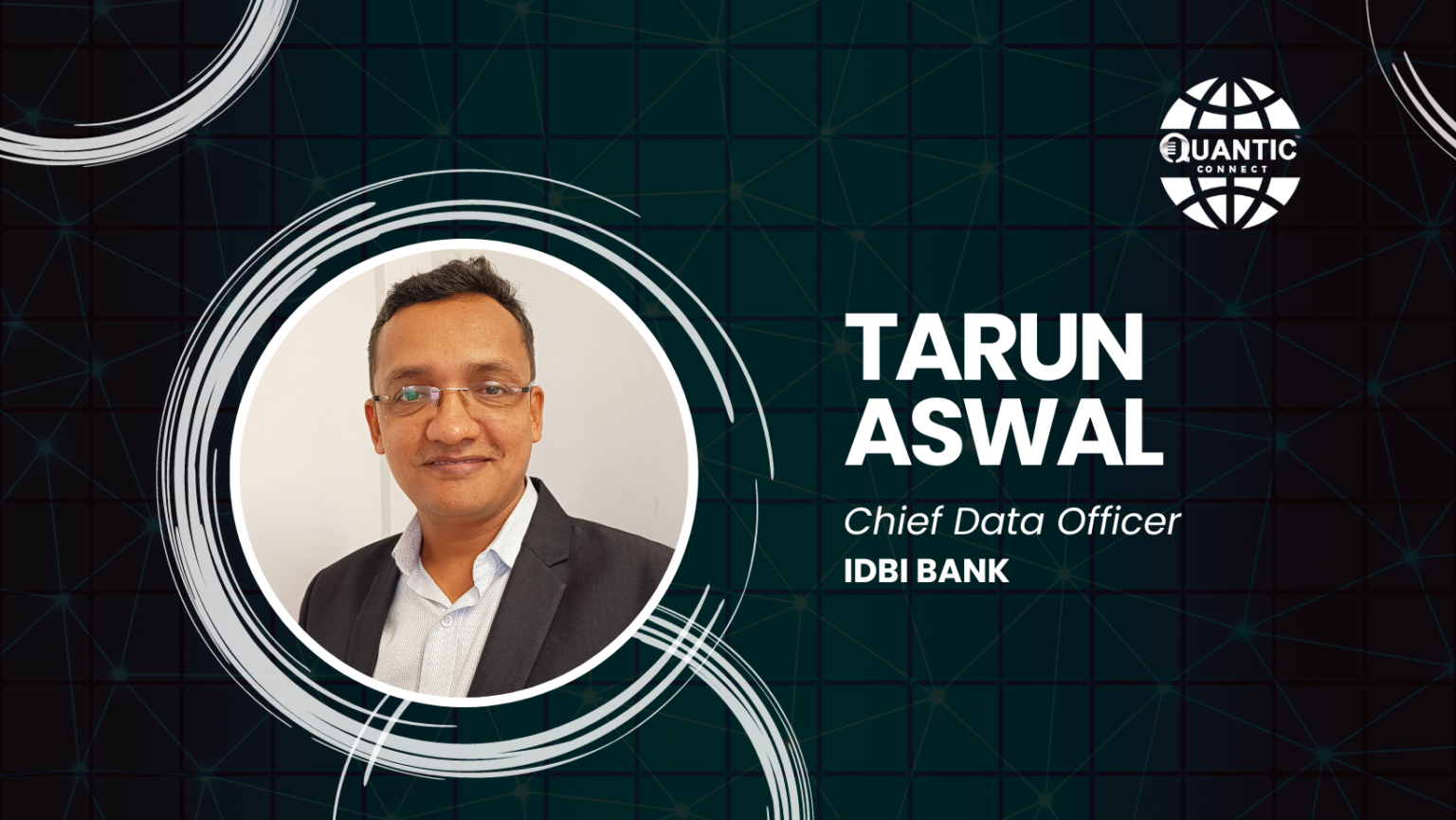Mumbai, December 21: Data analytics has emerged as a pivotal force within the banking industry, revolutionizing the way financial institutions operate and make strategic decisions. In an era characterized by vast amounts of data, banks harness the power of analytics to gain actionable insights, enhance operational efficiency, and improve customer experiences. This transformative approach involves the systematic examination of diverse datasets to identify patterns, trends, and anomalies, enabling banks to make informed decisions, manage risks, and drive innovation. From fraud detection and risk management to personalized customer services and predictive analytics, data analytics plays a crucial role in shaping the future of banking, fostering a dynamic and adaptive industry landscape.
Join Mr.Tarun Singh Aswal who is the Chief Data Officer at IDBI Bank in conversation with Mr. Marquis Fernandes, who spearheads the India Business at Quantic India, as they delve into challenges faced in implementing data strategy across the banking and insurance sectors, emphasizing the importance of data ownership and collaboration. The interviewee shares strategies employed, including the establishment of a Data Governance council and the implementation of an Enterprise Data Warehouse and Data Lake. Navigating unstructured data complexities is addressed, with a focus on scalability and agility. The integration of financial insights into the broader data strategy is explored, highlighting stakeholder management and prioritization based on ROI. The role of Machine Learning and Artificial Intelligence in shaping the future of data strategy is discussed, emphasizing the importance of trust and holistic model viewing.
Mr. Tarun Aswal has 20+ years of working experience in multiple roles, as a Chief Data Officer driving the Data Strategy and roadmap, with a demonstrated history of working in the computer software industry and various business verticals across Banking and Insurance. Skilled in Data Governance, Enterprise Data Warehouse, business analysis, IBM DB2, Data Warehousing, unstructured data, Machine learning, Data Science, Artificial intelligence, Business Intelligence and Solution Architecture.
What challenges have you encountered in implementing and driving data strategy across Banking and Insurance sectors, and how did you overcome them?
Data Ownership and collaboration across the different verticals to drive the Data Strategy is an important factor to the success of the implementation of the data strategy. The Business focus is primarily to ensure ROI is obtained from all actions related to Data. Data Strategy however, should be driven around the sustainable outcomes for Data Ownership, Data Quality, Data Integrity and various Data management and governance aspects.
In order to implement the Data Strategy, relevant matrices were published to the Business Departments, Data Governance Policy was formalized and the framework for Data Governance council was setup. In Data Governance council, the Data Stewards from Businesses and Technology are present together to focus on data issues and their sustainable remedial plans. This DG council is central to the Data Strategy, responsible for Data Integrity, resolution of Data Ownership issues and ensuring that the Data Quality is maintained as per the guidelines of the regulators. From reporting perspective, the Council reports to Board via suitable governing committees. This helps traction of the action points and reporting of the discussed agenda items in the Council to the Board and helps bring in the relevance and importance to the implementation of the Data Strategy.
Also ensuring the gap assessment for Data Strategy implementation is complete and the implementation of Enterprise Data Warehouse, Data Lake and real time data integration through the relevant technology partner is complete.
How do you navigate the complexities of unstructured data, and what strategies do you employ to derive valuable insights from such data?
Data can be in the form of images and feedback reports that can be difficult to decipher and manage if in volume. Over the past decade, data has grown significantly and companies have invested a lot in technologies like Big Data, Real time data ingestion and query, storing of data in parque formats. At times, solutions adopted do not focus on the other important aspects like scalability and agility or processing speed. In order to ensure that the secondary factors for success of deriving the valuable insights are also covered, a thorough discussion of the various technologies to manage, store and utilize the unstructured data has been undertaken including the vendors who provide such technology covering the relevant success factors. The strategy has been to generate the business outcomes with the scalability, user experience and agility factors covered.
This then leads to questions like whether the EDW setup is fine or a Data Lake is a better approach to manage the data. If the Data Analytics capability is to be enhanced? Do we proceed with the Auto-ML self-serve tools or have on-prem GPUs, what are the limitations of the two approaches?
Each of the options weighed on the Strategy and accordingly appropriate options and actions were undertaken.
A few organisations will want to add ROI or cost minimization as the main part of the Strategy, however this can lead to diluting the implementation of the Data Strategy. Data Strategy once properly implemented covering the relevant factors, will automatically lead to monetization.
With your finance knowledge, how do you integrate financial insights into the broader data strategy, and what benefits have you observed from this approach?
The stakeholder management is an important aspect of implementing Data Strategy, as it is needed to draw business benefits for those stakeholders. Be it data marts, or domain specific use cases from the Business Departments that want to make the use of the data, the specific strategy is defined in accordance to the needs of the Business Stakeholders, so that the benefits of the implementation are seen appropriately at the right time rather than after a significant wait for the business. The domain business knowledge also helps in the faster implementation of the data strategy. The business primarily sees the ROI and accordingly the data use cases that maximize the ROI need to be implemented ahead of similar use cases having less impact on the ROI. All the specific use cases, like Fraud monitoring, Early Warning Signals, Descriptive Analytics may be important but prioritizing them as per the need of the business considering ROI can help bring business buy-in to the various data initiatives.
In your opinion, how do Machine Learning and Artificial Intelligence play a role in shaping the future of data strategy, and what initiatives have you undertaken in these areas?
The outcome of the Data Strategy is the use of data for the organizational benefit. And the usage is enhanced when the trust on the Data, its technology and implementation to bring business benefits and outcome is established. That trust can be easily established by deploying the most appropriate Machine learning and AI tools, which is only possible when the right investment is undertaken as per the data strategy covering the relevant factors. We have primarily engaged with the right parties and not specifically the auto-ML, viewing models holistically, not in isolation and then taking the right actions in implementing those steps and in not using the technology in isolation anymore. This does take time, but it is better than running towards implementing what is available in the market as the ML models need to be appropriately trained with the right tools and techniques. This is only possible when one knows about the intricacy of the model development and understands how the right ML models bring in the desired outcome.
What are the critical skills and qualities that a successful Chief Data Officer should possess, and how have you cultivated and demonstrated these traits in your career?
Viewing overall specifics, data vision and strategy must not be in isolation. Having the Options Analysis, picking the suitable action as per the situation and the problem and ensuring the right decisions are followed as compared to the hurried ones are essential skills. Further, the Data Management, ML models, generating insights out of the models are also required. Putting forth the negative sides of the usage of the data is important in providing the right perspective to the end user of the data.
The process is ongoing and learning is essential to it, my educational background has helped me cultivate the knowledge and skills. I have specifically learnt about Business Analytics and ML Model building for three years, had the chance to work on Data privacy projects like GDPR and have always ensured problems are resolved with all the perspectives from the relevant stakeholders rather than in isolation.
To know more about us / publish your article, reach us at
www.quanticindia.com
marquis@quanticindia.com



